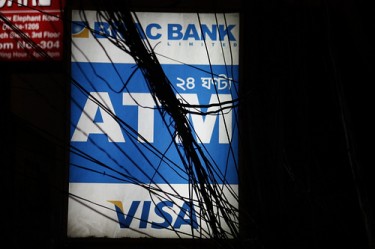In developing countries, where bureaucracy, corruption and misinformation thrive, people may create opportunities to cash in from those anomalies. Some consider this as creativity or simply a part of the livelihood and some question about the ethics in using those opportunities.
Bangladeshi blogger Mohammad Golam Nabi [bn] tells such a story:
মুনির ভাই সেই গল্পটা আজকেও বললেন। ডিমান্ড নোট বিক্রির গল্প। গল্পটা মুনির ভাইয়ের ভাষায় এমন:
‘আশির দশকের কথা। আমরা যখন বাংলাদেশ প্রকৌশল বিশ্ববিদ্যালয়ের শিক্ষার্থী, তখন আমাদের একটি বিশেষ বিনোদন ছিল খাওয়াদাওয়া। সেটি চায়নিজ, হাজির বিরিয়ানি বা নীরবের ভাজি-ভর্তা। টিউশনির টাকা, পত্রিকায় লেখার বিল বা বৃত্তির টাকা—অবধারিতভাবে আমাদের গন্তব্য কোনো রেস্টুরেন্ট। হিজ হিজ হুজ হুজ। এসবের মধ্যে আমাদেরই এক বন্ধু ১০০ টাকা জমলে একটি টেলিফোনের জন্য দরখাস্ত করত। যে সময়ের কথা বলছি, তখন বিটিটিবির (এখনকার বিটিসিএল) ফোনের অনেক চাহিদা। তারপর আমরা পাস করে বের হলাম। আমাদের পকেটে সুন্দর কাগজে জীবনবৃত্তান্ত। আর আমাদের ওই বন্ধুর কাছে বেশ কিছু ডিমান্ড নোট (টেলিফোনের বরাদ্দপত্র), ঢাকার বিভিন্ন স্থানের। মতিঝিলে তখন টেলিফোন সংযোগ অনেক টাকায় বিক্রি হয়। আমাদের সেই বন্ধুটি তার কয়েকটি ডিমান্ড নোট বিক্রি করে দিল—তাতে তার জোগাড় হয়ে গেল প্রাথমিক মূলধন। আমাদের ওই বন্ধুটি এখন একটি গ্রুপ অব কোম্পানিজের চেয়ারম্যান! আমাদের সঙ্গে তার পার্থক্য ছিল শুরু থেকেই। নিজে কিছু একটা করবে ভেবেছিল, সে জন্য ছাত্রজীবনে প্রস্তুতি নিয়েছে এবং সম্পূর্ণ নিজের উদ্ভাবনী বুদ্ধিতে ব্যবসার পুঁজি জোগাড় করেছে।’

Phone wires entangled around a ATM signboard in Dhaka. Image from Flickr by Joe Athialy. CC BY-NC 2.0
Brother Munir told the story again, the one about the allotment of Telephone (demand note). The story in his words:
“It was the '80s. When we were students of Bangladesh University of Engineering And Technology, one of our favorite pass-times were eating out, be it Chinese food, Haji's Biriyani or the fried/mashed vegetables at Nirob restaurant. Whenever we friends got some extra money from providing tuition, writing articles for newspapers or scholarship fund, we used to celebrate in a restaurant. Usually everyone paid for themselves. But one of our friends used to (eat little to) save money and whenever he could accumulate Bangladeshi Taka 100, he would apply for a land phone connection. I am talking about the time when there was much scarcity and demand for a new BTTB (now BTCL – the state telecommunication company) land phone connection. Then we graduated and started to carry our bio-datas in our pocket (in the lookout for a job). Our friend had got little extra; a number of demand notes (allotment letters of landphones) from different areas of Dhaka in his possession. Because of huge demand the connections could be sold at a price manifold than the book price, especially in Motijheel area (business district). My friend sold most of the demand notes and could accumulate enough capital for his startup business. he is now the chairman of a conglomerate. The difference between him and us was evident from the beginning. He planned to do something for himself, so he acted accordingly and used his creativity and talent to arrange his first capital.”
But Mohammad Golam Nabi does not endorse this. He writes [bn]:
প্রযুক্তিতে বাংলাদেশ নামের একটি সংগঠন আয়োজন করেছিল ‘আধুনিক পেশাজীবি ও উদ্যেক্তা তৈরি’ শীর্ষক এক মতবিনিময় সভা। মুনির ভাই সেখানেই বলেছিলেন গল্পটি। সেসঙ্গে আমার আপত্তির বিষয়টি। তিনি সত্যিই বলেছেন। আমার আপত্তি আছে। আপত্তির মূল কারণটি হলো একটি অসৎ ও রাষ্ট্রীয় আইন ভঙ্গকে মুনির ভাই প্রমোট করছেন। তার উপর আস্থাশীল বিপুল সংখ্যক ছেলেমেয়ের প্রতি তার যে দায়িত্ব সেটিকে তিনি বিবেচনায় নিচ্ছেন না।
He goes on [bn]:
একজন লোক সৎ কিনা সে কথাটি তখনই বলা যাবে যখন তিনি অসৎ হওয়ার সুযোগ থাকা সত্বেও সৎ থাকেন। যে লোকের ঘুষ খাওয়ার কোন সুযোগ নেই তিনি ঘুষ খান না সেটি উল্লেখ করার মতো বিষয় নয়। তার সততা পরিক্ষীত নয়। অপরাধ ছোট হোক আর বড় হোক অপরাধই। তবে জীবন রক্ষার্থে যখন কেউ অন্যায় করেন সেটি ভিন্ন প্রসঙ্গ।
Ethics is all about conducting your life faithfully and honestly, with complete integrity. And Nabi adds that a person should be judged by all the works in his/her life. Not merely with only one feat or one slip from grace.
মানুষের জীবন খণ্ডিত হতে পারে না। একজন মানুষের জন্ম থেকে মৃত্যু পরযন্ত পুরোটাই তার জীবন ও তাকে তার সারাজীবনের কাজের ভিত্তিতেই মূল্যায়ন করতে হবে। [..] একটা মানুষের ভালো থাকাটা সারা জীবনের বিষয়।







